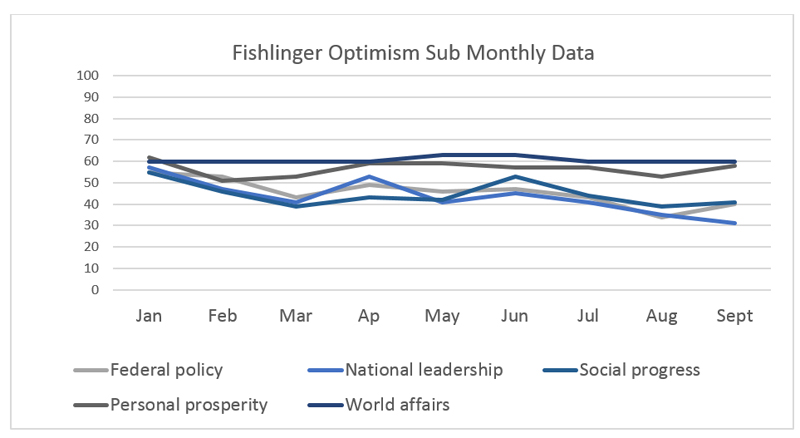The Fishlinger Optimism Index Recovers from Historic Low
10/5/2017
The Fishlinger Optimism Index™, a breakthrough measurement of public opinion centered on Americans’ optimism about the future from the Fishlinger Center for Public Policy Research at the University of Mount Saint Vincent, recovered slightly in September moving from 48 in August to 55 in September.

September was a mixed month for the Trump administration. President Trump’s compromise with the Democrats on the debt ceiling and refugees were viewed positively. However, his speech at the United Nations received mixed reviews and caused increased tensions with North Korea. His criticism of NFL owners and players also received mixed feedback. The effects of the Senate “no” vote on health care and the new proposed tax plan are yet to play out.
While World Affairs, Federal Policy, and National Leadership did not change, Social Progress and Personal Prosperity moved back up slightly.

The Fishlinger Optimism Index™ is more than an economic measurement. It is built on opinion data for public officials, social/political issues, beliefs about the United States’ place in the world, and a series of value statements dealing with individuals’ feelings of success and security, as well as from ratings of government policies and officials.
In measuring national leadership, Fishlinger Optimism Index™ assesses public expectations for the effectiveness of federal policy and quality of governance both domestically and in global affairs. Social progress examines the potential for progressive reform. Personal prosperity explores individuals’ sense of achievement and economic stability.
Survey Methodology
In this study, the Fishlinger Center conducted online national surveys focusing on political issues in the United States. The fieldwork for the polls was conducted using a blended national panel form Survey Sampling, Inc. Interviews were conducted November 29 – December 15, 2016 and January 3 – August 28, 2017. The credibility interval for 1,000 respondents is plus or minus four percentage points. The credibility interval is larger for subgroups and for differences between polls.
In addition to the credibility interval, the polls are subject to other potential sources of error including, but not limited to, coverage and measurement error. Data was rim weighted to match the national population on age, sex, Hispanic origin, and race. Question wording and topline results are available at [email protected].
About the Fishlinger Center for Public Policy
The Fishlinger Center for Public Policy Research opened in February 2015 at the University of Mount Saint Vincent. The Center conducts deep and broad studies of public opinion on key public policy concerns through independent and objective research conducted by students, faculty, and other members of the academic community.
By providing a forum for discourse that can stimulate intelligent dialog about issues that deeply affect all Americans, the Center illustrates and enhances the relationship between the work of the College and the common good.
James F. Donius, Ph.D., director of the Fishlinger Center for Public Policy Research at the University of Mount Saint Vincent, is available to speak to members of the press about the survey, the Fishlinger Optimism Index™, and the Center. To arrange an interview, or for more information about the study, please contact Public Relations at [email protected].
About the University of Mount Saint Vincent
Founded in 1847 by the Sisters of Charity, the University of Mount Saint Vincent offers nationally recognized liberal arts education and a select array of professional fields of study on a landmark campus overlooking the Hudson River. Committed to the education of the whole person, and enriched by the unparalleled cultural, educational, and career opportunities of New York City, the College equips students with the knowledge, skills, and experiences necessary for lives of achievement, professional accomplishment and leadership in the 21st century.
